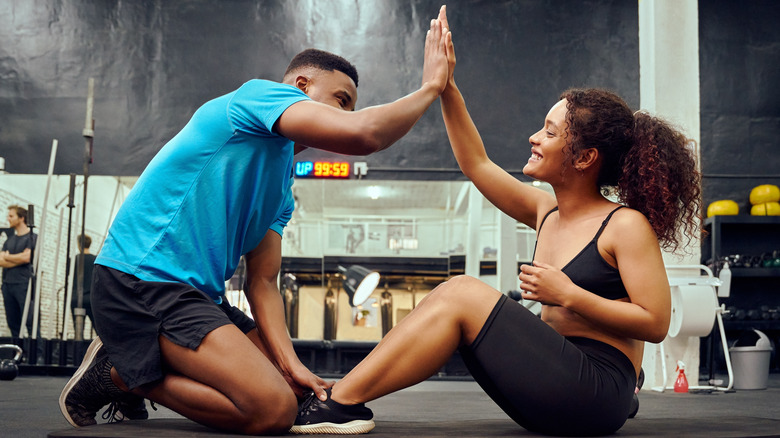3 Tips To Increase Your Motivation To Exercise That Actually Work, According To A Sports Psychologist
It's suggested that adults strive to get 150 minutes of exercise on a weekly basis, along with two additional days consisting of muscle-strengthening activities, according to the Centers for Disease Control and Prevention (CDC). However, getting ourselves up and moving is not always easy. Instead, it can often feel like a chore. In an exclusive interview with Health Digest, Sports & Performance Psychology Ph.D. Haley Perlus shares three bonafide tips for boosting our motivation to exercise and turning it into something we actually look forward to doing.
Her first tip is to make physical activity fun for yourself. "Find an activity or sport you enjoy and use it as your workout," Dr. Perlus encourages. "By doing this, you will be getting exercise while hardly even thinking about it because you're having fun." For some, this might mean joining a team, she explains, such as a recreational softball league or beach volleyball club. The key is finding an activity that is of genuine interest to you in order to help make exercise feel like less of a dreaded chore.
Find a buddy and track your progress
Dr. Perlus tells Health Digest that her second tip is for individuals to seek out an accountability buddy. "A workout partner is a good idea when trying to find the motivation needed to exercise because of accountability," she explains. Together, you can then work out actionable steps that will help keep you committed to your desired exercise goals. "After finding a partner, devise a schedule that works best for both of you. An example is every Monday, Wednesday, and Friday," Dr. Perlus offers. "Doing this will make you less likely to skip workouts because someone else is relying on you to show up." Not only that, but individuals will also get the extra perk of social interaction, Dr. Perlus adds.
Dr. Perlus' third tip is to log your progress by maintaining an exercise journal. "Writing down your goals and seeing the benefits of regularly exercising may help motivate you," she states. "After each workout, log what exercises you did, how long, and how you felt afterward." In doing so, Dr. Perlus explains that we can take stock of how far we've come while also strategizing for future goals.
Why these methods work
Dr. Perlus goes on to explain what it is that makes each of these tips effective. Starting with her first tip, she explains that making exercise fun will help keep us revved up rather than running out of steam over time. "Otherwise, it's possible to get burnt out and start skipping workouts easily. But if you're enjoying what you're doing, it's easier to maintain the motivation needed to continue to show up," Dr. Perlus shares. As for her second tip, Dr. Perlus reiterates that the key to success is accountability. "Knowing someone is relying on you can motivate you to do your best," she says. Moving on to her third tip, Dr. Perlus states that the reason an exercise journal can be effective is that it helps us appreciate our accomplishments while also giving us a push to keep going. "It can be gratifying to see on paper the progress you've made," says Dr. Perlus.
Dr. Perlus concludes by stating that there are also ways in which we can hold ourselves accountable to keep up our daily motivation to exercise. "Make a schedule; write down the days and times you're going to exercise," she says. "This way, there is no excuse for not having enough time."
To connect with Dr. Perlus, visit www.Drhaleyperlus.com or follow @hperlus on Instagram.



